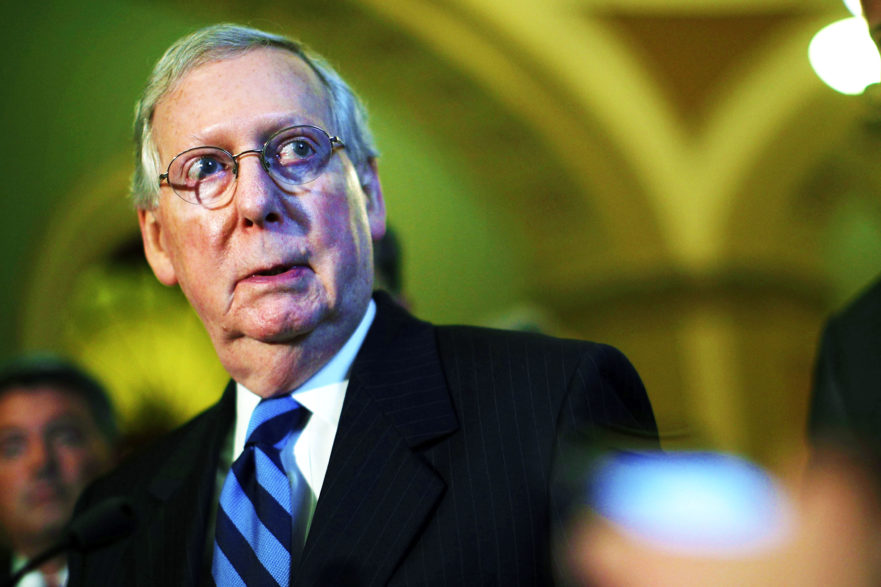Senate Majority Leader Sen. Mitch McConnell (R-Ky.) in July of 2017. Photo by Alex Wong/Getty Images.
Companies that retained the lobbying services of a longtime chief of staff and “dear friend” of Sen. Maj. Leader Mitch McConnell (R-Ky.), appear poised to benefit from the tax bill going before Congress this week.
Kyle Simmons served as McConnell’s chief of staff for at least 12 years, after which he became a lobbyist and, eventually, a founding partner of the Washington lobbying shop the Simmons & Russell Group. Lobbying-disclosure forms show that in the most recent quarter, Simmons personally lobbied the Senate on behalf of 10 companies and the trade group Pharmaceutical Research and Manufacturers of America (PhRMA). The forms list “tax reform” as one issue he worked on for all of them, most of which have publicly called for lower tax rates.
The companies for which Simmons lobbied on tax reform in the third quarter include American Airlines, Anheuser-Busch, Eli Lilly, ExxonMobil, Google, Toyota, and Wal-Mart. Prior to this quarter, Eli Lilly and Google had not paid Simmons & Russell to lobby on tax issues.
Disclosure forms do not break out how much money Simmons & Russell made on specific issues, and most forms include one or two additional issues, but the forms that include tax reform add up to $560,000 paid to Simmons & Russell for third-quarter lobbying.
Prior to serving as McConnell’s chief of staff, Simmons worked in Republican campaign politics, eventually running McConnell’s 1996 campaign.
In a 2010 speech about Simmons on the Senate floor, McConnell had to pause several times and at times appeared to cry while discussing the departure of his “colleague . . . confidante, and . . . dear friend.” Simmons has donated to McConnell’s campaigns as recently as last year, as well as to McConnell’s PAC, the Bluegrass Committee; the National Republican Senate Committee; and to McConnell favorites including Sen. Luther Strange (R-Ala.), who lost a bitter primary earlier this year against Judge Roy Moore.
The lobbying disclosure forms do not specify whether Simmons lobbied McConnell or any other individual senator. In response to an email from TYT, Simmons’ partner Bob Russell, who served as chief of staff to former Sen. Mark Pryor (D-Ark.), did not address that or other questions about their tax lobbying.
Several measures that would benefit Simmons’ clients found their way into either an early Senate version of the bill, or the final version negotiated between both chambers that is being voted on this week.
American Airlines will get a leg up on foreign competitors thanks to a tax on overseas assets. One measure that made it into the Senate version—only to be stripped out at the last minute by the parliamentarian—was an excise tax that would have applied to some foreign airlines.
Anheuser-Busch, another Simmons client, will be helped by an amendment that did survive in the final version and is aimed at aiding craft breweries but reportedly could be worth $12 million to Anheuser-Busch. That amendment was inserted by Sen. Rob Portman (R-Ohio), who also served on the conference committee that negotiated the final bill.
Data from the Center for Responsive Politics show that Simmons donated $1,000 to Portman’s most recent campaign. Simmons also donated to other GOP conference committee members, including $1,000 to Sen. John Thune (R-S.D.) and $1,000 to Sen. John Cornyn’s (R-Texas) Alamo PAC. Republican senators on the committee were appointed by McConnell.
Other Simmons clients also stand to benefit. Pharmaceutical companies—which are represented by the PhRMA group—and tech companies such as Google are expected to profit greatly from the bill’s provisions on repatriating foreign earnings.


